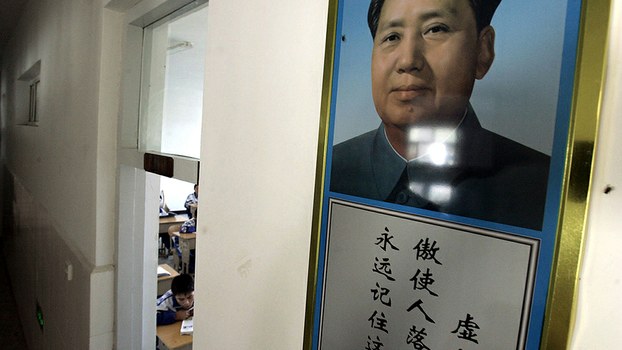Uyghur Schoolchildren, Parents Forced to Abstain From Fasting During Ramadan

Radio Free Asia, 21 May 2018
 By Gulchehra Hoja – Authorities in northwest China’s Xinjiang Uyghur Autonomous Region (XUAR) are forcing Uyghur students and their parents to sign pledges that they will not fast during the holy Islamic month of Ramadan in a bid to further undermine the religious traditions of the mostly Muslim ethnic group.
By Gulchehra Hoja – Authorities in northwest China’s Xinjiang Uyghur Autonomous Region (XUAR) are forcing Uyghur students and their parents to sign pledges that they will not fast during the holy Islamic month of Ramadan in a bid to further undermine the religious traditions of the mostly Muslim ethnic group.
Officials have typically forced restaurants to stay open and restricted access to mosques during Ramadan, and last year sources told RFA’s Uyghur Service that Uyghur Communist Party cadres, civil servants and government retirees were made to sign documents that said they would neither fast nor pray during the holy month, ostensibly to set an example to other Uyghurs in the community.
But a student in Kashgar (in Chinese, Kashi) prefecture’s Peyziwat (Jiashi) county recently told RFA that school officials made him and his classmates sign agreements with their parents that they would not fast during Ramadan—which falls between May 16 and June 14 this year—marking the first time authorities have been known to target school-age children with the measures.
The report suggest that authorities are making unprecedented incursions into the personal lives of Uyghurs to eliminate what they call signs of religious “extremism” in the region.
“As we are students, we don’t fast,” said the student, who spoke with RFA on condition of anonymity.
“We have signed a school agreement and also written a letter of promise.”
When asked if his parents were fasting during Ramadan, the student said that they weren’t because “they are not allowed to practice such things in front of … their children.”
“To act as role models, of course they will not fast,” he added.
A female cadre from Peyziwat county said that ahead of Ramadan “all cadres and party members were called to the county office for a meeting, in which we were told to ‘be more vigilant’ and to ‘pay special attention’ to anyone who complains about the government’s policy regarding religious extremism.”
“The cadres are working hard on … educating [residents] about the incorrectness of fasting,” she added.
When asked whether fasting was considered an “illegal religious activity,” the cadre acknowledged that it is not, but said “people shouldn’t complain when living under such good conditions.”
She also confirmed a report by New York-based Human Rights Watch (HRW) earlier this month that authorities are imposing regular “home stays” on Muslim Uyghur families of cadres who record information about their lives and political views, and subject them to political indoctrination, as part of an increasingly invasive “strike hard” campaign in the region.
“They are helping farmers get out of poverty,” she said of the home stay policy, which the government says provides families with access to education about technical skills and teaches them Mandarin Chinese to help residents find better work.
Other sources, including an officer at a police station in Aksu (Akesu) prefecture, said increased security measures are in effect around the region during Ramadan.
“We have intensified patrols in order to retain stability, and at the moment there are no instability issues,” said the officer, before hanging up the phone.
Existing measures
The new restrictions surrounding Ramadan are in line with existing measures targeting religious “extremism” that have been introduced in recent years.
Since April, thousands of Uyghurs accused of harboring “extremist” and “politically incorrect” views have been detained in political re-education camps and prisons throughout Xinjiang, where members of the ethnic group complain of pervasive discrimination, religious repression, and cultural suppression under Chinese rule.
Authorities have relied on a list circulated early last year of “75 Signs of Religious Extremism” to detain Uyghurs amid a string of harsh policies attacking their legitimate rights and freedoms enacted since Communist Party secretary Chen Quanguo was appointed to run the region in August 2016.
Among the signs of extremism on the list were “conducting business as usual” and “women who wear religious clothing to work” during Ramadan, “storing or purchasing large quantities of food for home” and “acting abnormal,” and “praying in groups in public outside of mosques.”
But party officials told RFA that they had been notified of several new “signs of extremism” in April last year, including people who stand with their legs wide apart while praying, dye their hair with henna, wear short trousers, wear a watch on their right wrist, and those suddenly abstaining from alcohol.
Another list informs officials to watch out for the so-called “28 Signs of Illegal Religious Activities.”
Ahead of Ramadan this year, the Munich-based World Uyghur Congress (WUC) exile group issued a statement urging the Chinese government to ensure the right to religious freedom for Uyghurs, and to allow them to observe the holy month without restrictions.
“Each year, the month of Ramadan has been turned into one of fear and anxiety because of the increased restrictions, which has caused untold disturbance in the daily life of the Uyghur people,” WUC president Dolkun Isa said at the time.
China regularly conducts “strike hard” campaigns in Xinjiang, including police raids on Uyghur households, restrictions on Islamic practices, and curbs on the culture and language of the Uyghur people, including videos and other material.
While China blames some Uyghurs for “terrorist” attacks, experts outside China say Beijing has exaggerated the threat from the Uyghurs and that repressive domestic policies are responsible for an upsurge in violence there that has left hundreds dead since 2009.
Reported by Gulchehra Hoja for RFA’s Uyghur Service. Translated by RFA’s Uyghur Service. Written in English by Joshua Lipes.
https://www.rfa.org/english/news/uyghur/schoolchildren-05212018151019.html

